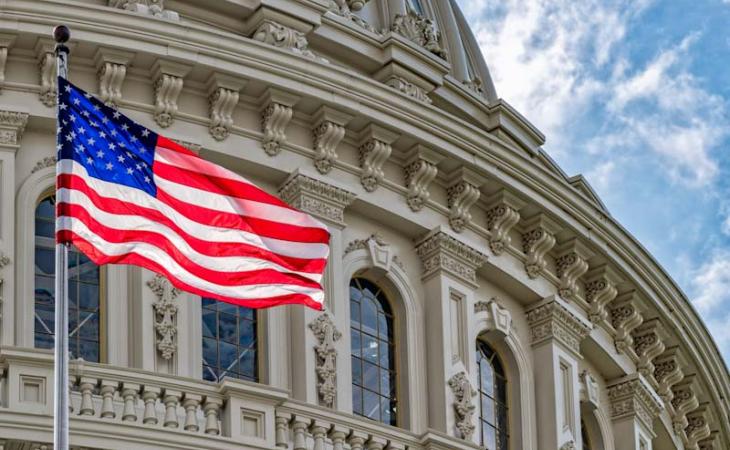This website uses cookies so that we can provide you with the best user experience possible. Cookie information is stored in your browser and performs functions such as recognising you when you return to our website and helping our team to understand which sections of the website you find most interesting and useful.
News
Legislative Update: COVID-19 Relief & Plastics Recycling
The House of Representatives is on recess until November 16th after taking legislative action on several bills of interest. Democratic leadership may call members back for a potential vote on a coronavirus stimulus bill they have been working on with administration officials. Senate Majority Leader Mitch McConnell (R-KY) has postponed floor activity through Oct. 19, in the wake of many senators exposed to COVID-19 through the recent White House outbreak. McConnell still plans for the Senate Judiciary Committee to move forward with its confirmation hearings for Supreme Court nominee Judge Amy Coney Barrett, which begins Oct. 12.
Coronavirus Relief
A coronavirus relief package deal has been on an unpredictable path as negotiations have seen a series of starts and stops. For months it has mostly been in a holding pattern as negotiations remained in a stalemate. Democrats first passed the $3 trillion HEROES Act (H.R. 6800) in May, but the Senate never took up the legislation. Since May, the need for funding and assistance has increased significantly as the beleaguered economy continues to take hits from businesses closing, unemployment rising, and industries no longer having safety nets. Negotiations between the White House and Democratic leadership got Democrats to bring their bill’s price tag down to $2.2 trillion while Republicans countered with raising their $1 trillion proposed amount to $1.6 trillion. From that point on, neither side agreed to budge to meet further in the middle despite several attempts and even a proposal from the bipartisan Problem’s Solvers Caucus.
On Oct. 1, 2020, the House passed (214-207) a revised version of the HEROES Act dubbed HEROES Act 2.0 that provided $2.4 trillion in relief that included support for small businesses through the Payroll Protection Program (PPP), individuals, state and local governments, extended unemployment, and provided additional targeted aid for specific industries. The bill was a marker to help kick start negotiations again between the administration and the Senate, but on Oct. 6, President Trump abruptly instructed his officials and Republicans to stop negotiations on any new COVID-19 stimulus until after the Nov. 3 elections.
The President said his decision was due to the Democrat’s unwillingness to come down any further in relief costs. Majority Leader Mitch McConnell (R-KY) agreed with the President’s decision to end talks and have the Senate “concentrate on what’s achievable.” While it is unlikely the Senate could unite its caucus behind another stimulus package, several Republicans in the ranks decried the move as millions of Americans have lost their jobs and several vital industries need immediate aid. Speaker Pelosi expressed disappointment with the President’s decision “to abandon the economic & health needs of the American people,” she said. Later in the evening, the President reversed course and indicated that he might seek individual stand-alone bills that would provide relief to airlines, more aid to small businesses through the Payroll Protection Program (PPP), and $1200 stimulus checks to individuals. Pelosi and congressional Democrats have previously expressed opposition to a piecemeal stimulus proposal, arguing it does not meet the mammoth needs of an economy still reeling from the effects of Covid-19 restrictions and unemployed workers. For now, the talks are back where they started, in a stalemate waiting for the other side to move.
Continuing Resolution
On Oct. 1, President Donald Trump signed a short-term continuing resolution (CR) (H.R. 8337) to extend the current appropriations funding levels through Dec. 11, buying more time for lawmakers to get through the November elections and then try to wrap up in a lame-duck session.
The Senate cleared the measure on Sept. 30, on an 84-10 vote. The measure quickly passed the House on Sept. 22 in a 359-57 vote.
Plastics and Recycling
On Oct. 1, the House of Representatives unanimously agreed to pass the “Save Our Seas 2.0 Act” by voice vote. The “Save our Seas 2.0” (S. 1982) package and stand-alone bills were introduced by Senators Dan Sullivan (R-AK), Sheldon Whitehouse (D-RI), and Bob Menendez (D-NJ). The bill focuses on improving domestic infrastructure through grants and a new state revolving loan fund and would authorize $10 million annually from 2021 through 2025 for three other new grant programs on drinking water infrastructure, wastewater infrastructure, and trash-free waters. It would create a Marine Debris Response Trust Fund and direct the U.S. Environmental Protection Agency (EPA) to study and develop a strategy to improve waste management in oceans and waterways. The bill also promotes development of materials that can fully degrade in the sea and requires the Commerce Department to report to Congress on innovative uses for plastic waste other than in infrastructure.
The House Foreign Affairs Committee on Oct. 1 marked up and reported the Partnering and Leveraging Assistance to Stop Trash for International Cleaner Seas (PLASTICS) Act (H.R. 4636) out of committee. The bill sponsored by Rep. Michael McCaul (R-TX) authorizes the Secretary of State and the Administrator of the United States Agency for International Development in coordination with the heads of the relevant federal departments and agencies, to prioritize and advance ongoing global efforts to prevent and reduce marine debris and plastic waste, including through reduced consumption, greater transparency in global trade of plastic waste and support for integrated waste management systems in developing countries.


